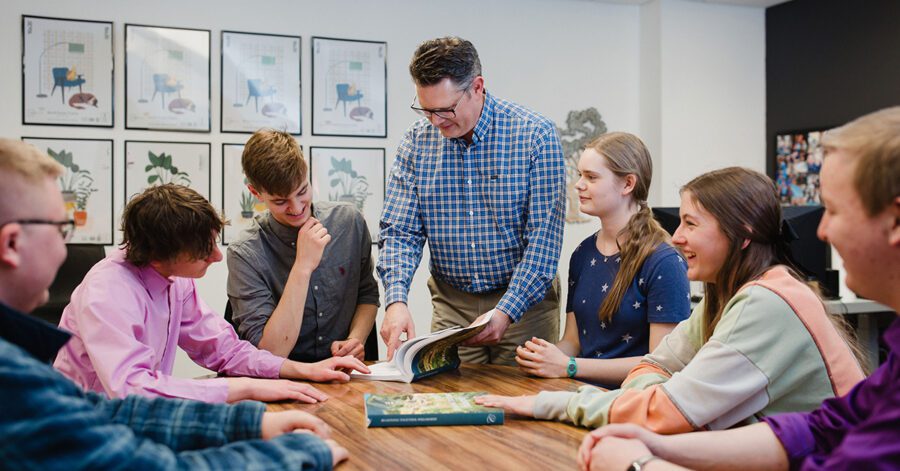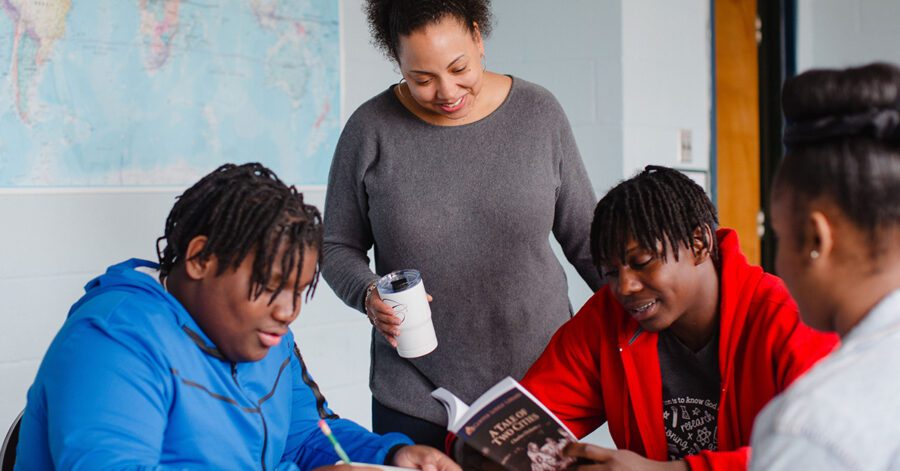It is planning time for Classical Conversations three-day Parent Practicums. I look forward to learning something new and getting inspired for the next school year, but most of all, I look forward to three days of adult conversation.
The word “conversation” can be overlooked during Practicums because we work so hard to understand the “classical” model and how it is the backbone of our teaching philosophy, but “conversation” is at the heart.
I attended my first Classical Conversations Parent Practicum as a skeptic. My children were enrolled in a private Christian school and I had made my nonrefundable deposit. I went to a Practicum because a friend recommended that I go and my husband, ever the do-it-yourselfer, had always wanted to homeschool. My conversations with Leigh and the other parents gave me the confidence to want to homeschool. I called my husband during lunch on day two and said, “I think I can do this.” Leigh’s message was the same seven years ago as it is today, “You can do it. You are smart enough. We will help.”
Other moms shared their stories during breaks, and among tables of books in the lobby they helped me find timeline cards and all the things I needed to get started. Their children befriended my children. Those conversations changed our lives.
Conversations between moms fulfill the biblical instruction to, “…encourage one another and build each other up…” (1 Thessalonians 5:11; NIV 1984). This is one of the goals of Classical Conversations, to connect parents who can build each other up. We connect through weekly Classical Conversations communities and through the Practicums. So, even if this is your tenth Practicum, I hope you will know how much a new mom might appreciate your conversation this year.
We also use the word “conversation” to refer to the study of great books. Rene Descartes once said, “The reading of all good books is like a conversation with the finest minds of past centuries.” We show our Challenge students how to understand and compare great ideas from great books and documents.
We also have great discussion with our students as we examine each subject. However, as I was preparing for my Challenge A class recently, I realized that I have been teaching very specific expectations for public speaking (such as stand up straight, do not fidget, project your voice, enunciate your words clearly, and make eye contact), but, when it came to conversation, I was expecting a fabulous conversation from a group of ten twelve-year-olds without giving them any instructions about how this should be done. I did not know if there were any official guidelines on conversation. A quick search revealed that I am not the first to ask this question. In fact, Cicero made the same observation in 44 B.C.
The rules we learn from Cicero are:
Speak clearly;
Speak easily but not too much, especially when others want their turn;
Do not interrupt;
Be courteous;
Deal seriously with serious matters and gracefully with lighter ones;
Never criticize people behind their backs;
Stick to subjects of general interest;
Do not talk about yourself;
Above all, never lose your temper.
(Source: Staff writer. “The art of conversation: Chattering classes.” The Economist. The Economist, Dec 19th 2006, from the print edition. Web. 23 March 2012.)
These guidelines might seem obvious, but we cannot assume that our children know these rules. We can teach them, though, as easily as we teach public speaking or multiplication tables. (These rules may be easier to learn than multiplication tables, but we should expect to have to use repetition.)
The boisterous students need to be reminded not to speak too much and not to interrupt. Shy students need to know that their input is not just welcome, it is important and expected. I, as the teacher, need to remember that conversation is a more valuable teaching method than lecture, so I need to remember not to dominate the conversation and fall into preaching; I need to ask questions that lead the students into thinking, and allow them the opportunity to talk through their ideas. Conversation—good conversation—is not just passing information to others; it is the opportunity to think and form one’s own ideas and put those ideas into words.
The word “conversation” is threefold in “Classical Conversations.” It is the biblical mandate to “build each other up,” it is the study of great books, and it is the activity of forming and exchanging ideas. Parents and students learn and benefit from all three aspects of “conversation” in Practicum and in Classical Conversations communities.
I want to thank everyone for the great conversations I have enjoyed since becoming a part of Classical Conversations and I look forward to many more at the Practicums this summer.




